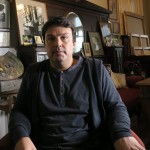After winning 70 major awards, including an Academy Award (Best Foreign Film), for his last film, A Separation, Writer/Director Asghar Farhadi is no longer just the most celebrated Iranian filmmaker around, but a contender on the world stage. Like A Separation and the award-winning About Elly, The Past is a beautifully made and acted drama about the complexity of relationships between lovers, spouses and children. Just how Farhadi makes this very broad topic so fresh and specific is down to his artistic vision.
But The Past also signals a major departure for the 36-year-old as it is Farhadi’s first film shot in France and in French, a language he does not speak. It is also less concerned with religious custom and cultural restrictions than with the intrusion of the past on our ability to move forward.
Marie (Bérénice Bejo, The Artist) works in a pharmacy and has two daughters, Lucie, (Pauline Burlet) about 17, and Léa (Jeanne Jestin), about 8, from a man who lives in Canada and of whom we know nothing. She shares her crowded suburban house with the stern and withdrawn Samir (Tahar Rahim, A Prophet) and his son of about 8, Fouad (Elyes Aguis) although Samir has kept his flat above the dry cleaning business he runs.
When we first see Marie, however, she is meeting Ahmad (Ali Mosaffa) – the Iranian man she lived with before she met Samir – at the station. Marie has asked Ahmad to return to Paris after four years to sign the divorce papers, although it could have been finalised by post. She does not book him a hotel, which he finds strange. Moreover, although Samir is not staying at Marie’s during Ahmad’s visit, Marie proposes that Ahmad share a room with the vulnerable and troubled Fouad. This, too, makes Ahmad uncomfortable, but when he sees he can be useful around the chaotic house, he agrees to stay.
While Ahmad ponders Marie’s motives, she is suspicious about the motivation behind her estranged daughter Lucie’s disappearances and hostility. Is Marie being disingenuous when she pretends not to have an inkling? After, all, Lucie has known three father figures, two of whom have abandoned the family. The third, Samir, has already proven unfaithful to his wife and abandoned her. Instead of approaching her daughter with tenderness, Marie asks Ahmad, who is due back in Tehran, to stay and serve as the go-between.
The dark Jane Eyresque secret in the extended family that takes over the last third of the film is Ahmad’s wife who is in a coma after a suicide attempt. The more we and the characters learn, the more both Samir and Marie are racked with guilt.
Each character is carefully drawn and given due attention although we find that we know more about some than others. We never, for instance, learn what Ahmad does in Tehran, or the reason for his departure (depression is all that is mentioned). It is refreshing, too, to find people who do ordinary, unglamorous jobs rather than working in art galleries or in fashion magazines.
Most of the ‘action’ is the characters sitting in cars, standing in doorways, knocking on doors, walking through doorways, working around the house or asking each other to sit down and listen. Toward the end, the film becomes an almost forensic investigation regarding Samir’s wife. This might be a step too far, but it adds a further obstacle to Marie’s desire to move on with her life. Samir is living in limbo as it is only when his wife is off life support that he can find happiness. But can he be happy when his son’s mother is in a coma and guilt is carving a chasm between him and Marie?
This complex story of a messy family life could have turned into an unconvincing melodrama in lesser hands. Such is the skill of the good-looking cast and the compelling way in which Farhadi focuses on them, that you remain riveted to their dilemma. Marie, who reveals she is pregnant with Samir’s child, wants to move forward, but everyone around her, and her own feelings and moral compass, are holding her back. The film seems to be asking whether we really can start afresh or when the ties that bind are too strong.
Joyce Glasser




